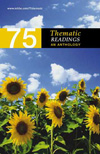
Lewis Thomas |  |
Lewis ThomasLewis Thomas, "The Lives of a Cell" Lewis Thomas (1913-1993) was born in Flushing, New York and earned
a B.S. from Princeton University in 1933 and an M.D. from Harvard University
in 1937. He taught and practiced medicine, and was an administrator at
such places as the Rockefeller Institute, Johns Hopkins University, Yale
University, and served as president of the Memorial Sloan-Kettering Cancer
Center. Thomas's books include two National Book Award winners: The
Lives of a Cell: Notes of a Biology Watcher (1974) and The Medusa
and the Snail: More Notes of a Biology Watcher (1979); as well as
Late Night Thoughts on Listening to Mahler's Ninth Symphony (1983)
and The Fragile Species (1992). Thomas also contributed to periodicals
such as the New York Times and Foreign Affairs. This essay,
which sees our whole ecosystem in a single cell, was first published in
1971 in The New England Journal of Medicine and was reprinted in
The Lives of a Cell. | QUESTIONS FOR DISCUSSION | CONTENT - What trouble with "Modern Man" does Thomas allude to
in his opening?
- Describe the relationship between chloroplasts and green plants.
- Define the word symbiont.
- Discuss the illusion the author describes in the second paragraph.
- What are mitochondria? What do they do? Name some of the "other
little animals" we have in our cells.
- Describe the slightly atypical view of viruses the author presents.
What makes his view atypical?
STRATEGY AND STYLE - Three times Thomas starts a paragraph with the word item
in italics. Explain how this rhetorical device functions. Do you find
it effective?
- Find two comparisons made to the earth in the first paragraph,
and one in the last. What mental images do they evoke? How do they change
from the introduction to the conclusion? What work do they do to explain
the author's views of the earth?
- How would you characterize this essay in terms of rhetorical mode?
Does the author structure it by means of showing cause and effect, by
providing examples, by illustrating comparisons and contrasts, or by
some other means? Support your answer with specifics from the essay.
| ENGAGING THE TEXT | - How comfortable are you reading about science? How about biology
in particular? How did your comfort level in this area effect your reading
here?
- What do you think about when you consider the
differences between humans and other animals? Did any of these thoughts
go through your head during your reading? Are you thinking of any parts
of the reading right now?
| SUGGESTIONS FOR SUSTAINED WRITING | - William S. Burroughs once wrote, "Language is a virus from
outer space." Review your answer to Content question f.) above,
and write an essay speculating about how Thomas might have responded
to that statement. Be sure to discuss human beings' special relationship
to language and the "outer space" part in light of Thomas's
views of the earth.
- Thomas writes, "Man is embedded in nature," but that
we sometimes do our best to avoid thinking about that proposition. Form
that idea into a thesis for an essay, and write about nature's ways
of reminding us of our relationship to it, and why we sometimes want
to deny that relationship.
| FOR FURTHER RESEARCH | Review your answer to Content question e.)
above and do some research about centrioles and basal bodies. What do
they do? How did your research about these organisms enhance your understanding
of paragraph five? | WEB CONNECTION | Thomas's career and life were an admirable blending of art and science.
Interested in pursuing this blend further? This page
shows the result of searching for these terms using the search engine
at Google.com, and will give you plenty of places to start your research. | LINKS | Biographical This is an excerpt
of a review by Stephen Jay Gould of Thomas's autobiography, The Youngest
Science: Notes of a Medicine Watcher. There's a link to get the
rest of the review on this page. Can you think of another way to get
the full article? Here is a no-frills biography
of Thomas from The Columbia Encyclopedia. This biographical sketch
of Thomas, written by an M.D., also has a photo of Thomas and one of
Thomas's poems.
Bibliographical In 1992 Thomas conducted this interview
with BookPage, following the publication of his collection of essays
The Fragile Species. Ready for a bit of conflict? Read this reply
by a Harvard professor to a New York Review of Books piece by
Thomas, and Thomas's counter-reply. Subject: The history of tuberculosis.
How can you characterize Thomas's argument here? Looking for a quotation by Thomas for a research paper? Here's
a great one about
doctors and healing.
Cultural This page
contains Thomas's citation for his 1981 National Book Award. Look over
the other names on the page. Whose do you recognize? How would you go
about learning more about them? Did you know that Thomas has a prize named after him? Read more
about it in this press
release from Rockefeller University. Thomas was the head of a world-famous cancer treatment center.
Do you remember which one it was? Click here
to refresh your memory, and find out more about this center.
|
|
|
|